by Carol A. Westbrook
We think about our fathers during the month of June. Father’s Day is a time to remember these beloved men, especially those who have passed. We reflect on how remarkable their live were, and of so many questions we’d ask them if they were still alive. I’ ask my Dad what he would have done if we were living together at home during the Covid-19 epidemic.
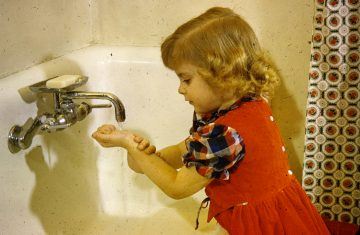
Actually, I don’t need to ask him; I know exactly what he’d do. He’d have followed the guidelines to the letter. He would set the family rules: 1. Masks and gloves when we go out — and no more family drives for hot dogs, Italian beef, or ice cream cones. 2. Wash hands a lot. 3. (That’s me in 1956, doing the right thing!) Play only in our yard, and not with other kids–so no more wiffleball games in the alley, or running under the sprinkler on the front lawn. 4. Meals together, as usual. 5 Pray together as a family every night. For supplies, he’d take advantage of our well-stocked basement “bomb shelter” storage, pantry and deep freezer.
Dad would have obtained supplies for the lockdown using connections at his workplace, the Chicago Board of Education. In true Chicago style, he would call in favors or promise favors of his own, like a good word to a Department head for a city job. Or he could offer professional family portraits, or wedding photos. He also had gossip and information to share.
For supplies, he would get toilet paper and disinfectant from a school janitor. He’d get masks and gloves from a school nurse, or possibly from the office of his cardiologist at St. Mary’s of Nazareth Hospital, to which he gave generous support to assure the best medical care should it be needed. He would call upon principals and teachers that he knew in the public schools, and ask them to provide textbooks and workbooks at the appropriate age level so we kids could home school. Everyone knew Chester, and all were his friends. At Christmas, each one got a nice box of expensive, imported cheese and chocolates (purchased wholesale from his brother Ray, a deli distributor). This was the Chicago Way in the 50’s, the time of Mayor Richard J Daley, and everyone knew the rules. You do a favor, you call in a favor. If you’re from Chicago you would understand.
Yes, he was a remarkable man. Let me take you back the winter of 1917, when Chester Felix Garstki was born to Polish immigrant parents, the 7th of 12 children. It was a bitterly cold winter; the flu pandemic and WWI still had almost two more years to go, followed closely by the Depression, then the Second World War. Resources for Chester’s large family were always in short supply, from fighting siblings for a second helping, to Depression deprivation. He never had a chance to go to college, and was pleased to get a job as a bagger in a National Tea grocery store, eventually working his way up to produce manager. He learned how to shop for groceries and recognize a bargain. Like many children of the great Depression, stockpiling food became a lifelong obsession.
Folklore has it that the 7th child is given special gifts. Indeed, Chester was blessed with both a scientific, analytical mind as well as artistic talents–a keen eye for composition, an amazing ability to capture facial expressions, and a sense of beauty. His unique gift, though, was the gift of gab. He could charm anyone–or talk himself out of a fix. Chester never forgot anyone he met, and everyone was his friend.
Chester taught himself photography, which became his profession. Photography required precision, some technical knowledge of the chemicals needed to develop and print photos, and an understanding of lenses and cameras. Here is his self-portrait in his darkroom, at age 20.
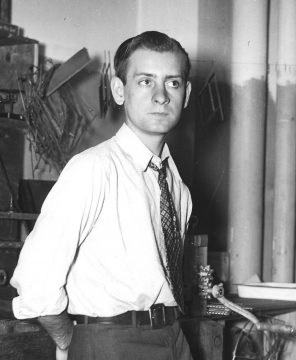
But it also required talent: a sense of beauty and proportion, and a good eye for composition and lighting. Dad was a talented photographer, and easily picked up jobs as a freelancer, eventually landing a prestigious job as a photojournalist at City News Bureau. This must have been exciting for him, covering city events, having a Press Pass that gave him access to many places, and seeing his pictures in print. One of his favorite photos was a shot of a young Judy Garland, below, taken at the Chicago Theater; she looks fresh and bright in this candid shot! His photography skills got him noticed, and he was offered a job at the Chicago Board of Education, doing photography and public relations. He jumped at the offer; a City job would offer lifetime employment at a union salary, a generous pension, and invaluable connections. Truly an accomplishment for a non-Irish, ethnic Chicagoan, in Mayor Daley’s City Machine.
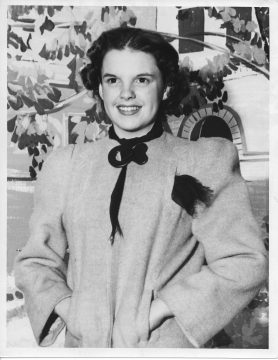
Shortly after starting his new job, 1943, he was drafted into the Army. There he honed his skills as an official Army photographer. The war in Europe ended shortly after he was drafted, but his photography skills were noted, and he was assigned as official photographer to the staff of General Mark Clark, head of the Occupation forces. He was one of the few non-commissioned officers on the general’s staff, and worked closely with the officers on the PR staff, including a professor of journalism, Edmund Arnold, with whom he maintained a lifelong friendship. Ed taught him to write headlines and polish his style. Chester did his best work in the Army, arguably as good as many noted newspaper battle photographers who got more credit for their signed work. Here are two of Chester’s favorite photos. The first, “Chow Line” hows US forces in a bombed-out French town. Below it, Mail Call” with soldier in the trenches getting their mail from the States. The face and posture of each infantryman tells a story in thee pictures.
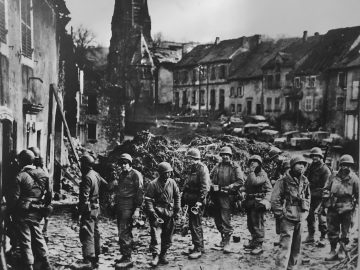
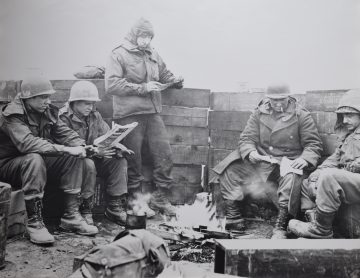
Dad’s most famous wartime photo was of General George MacArthur, riding a white Lipizaner stallion, which got posted to most of the wire services in the US. If you recall the movie, Patton, there was a scene with the General “liberating” the Lippanzers, and a photographer following him and snapping his photo. In real life, my father was the photographer!
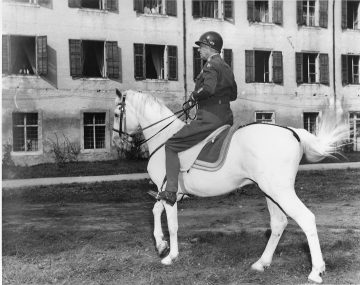
Chester took up his job at the Board when he returned from the War, married his sweetheart Cecilia, with whom he had four children. I was the second. He loved us all, and taught us many things; he gave me a Brownie camera and taught me a lot about lighting and f-stops, and photo composition, but I never had his eye. Chester spent 43 years at the Board, during which time he helped to launch the public television station WTTW, and the City Science Fairs, and expanded the photography department to cover public relations. He had a Press Card, state-of-the art equipment and darkroom. He did all of his work in black and white, developing and printing it himself. He had his own darkroom at home for his side business, covering weddings and other events. He was especially expert at photographing students, capturing the look of interest and wonder in their eyes, making an effort to always include a racial mix in the classes. He spent his day driving around Chicago visiting various schools and doing the publicity shots, special projects, and assignments. He got to know all the principals and many of the teachers, who were always grateful for the publicity. Everybody knew Chester, and he was everyone’s friend. He told me his real job was to collect information and gossip, because he could go anywhere in the system. He would relay the info to the Superintendent and Department heads–it was his own brand of journalism! What he had to parlay was information.
The Board had a unique position in the Chicago political scene, with its own independent budget, which was controlled by its own Board. It was one of the biggest budgets in the City, which was needed to maintain the physical plants for a large number of primary and secondary schools and at least 2 colleges; the budget also provided book and supplies to the students; it was used to pay the principals, department heads and administrators, and provide Union wages for all the non-management employees–the Board handled jobs for at least two big unions, the Teachers, and the City Workers (janitors, cafeteria workers, etc.). It also paid into the generous to which every City employee was entitled. You can see why jobs were the most important asset of the school system, as jobs represented power in the Daley City Machine.
The bomb shelter is another story. Ever since his birth, Chester was a survivor. But he was not a survivalist. The “bomb shelter” started out as a large walk-in pantry in the basement, where my folks kept their stockpiles of canned good and supplies that they bought on sale, to support Chester’s Depression obsession with having enough food. Later they added a chest freezer to keep meat purchased in bulk when on sale. Dad knew about the Cold War before it had that name, since he learned to fear and distrust the Russians due to his experiences in the Occupation Army with partitioned Vienna. His basement pantry translated easily into a bomb shelter, as nuclear holocaust survival frightened us all in the 1950’s. This food and supply stockpile could easily be adapted for survival during the pandemic lockdown.
As a child, I thought my father could do anything. Now, as an adult, I think of him and realize just how talented and versatile he was. And how much he loved hi family. Here’s a photo of Dad in 1982, taking his grandson through his paces as a budding photographer.
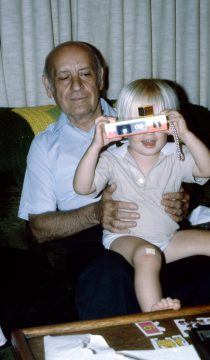
Of course we know our fathers were the greatest men who ever walked the earth! This is especially so on Father’s Day, when we wish that our deceased dads were still around, so we could ask them the questions we never thought to ask when they were alive. We Boomers felt we were the greatest generation, since we tackled the Vietnam war, and protested racial and sexual inequality But this was nothing compared to Dad’s life–growing up an immigrant in Chicago, a toddler during WWI, living through the Great Depression, and going to Europe to fight for our freedom. Then returning home, using his ingenuity to find a great job, and providing for a large family, and raising us, impossible Boomers! Whew! Who could do this today? Yes, his was the Greatest Generation. I concede. Happy Father’s Day. Chester Garstki died in 1997.
